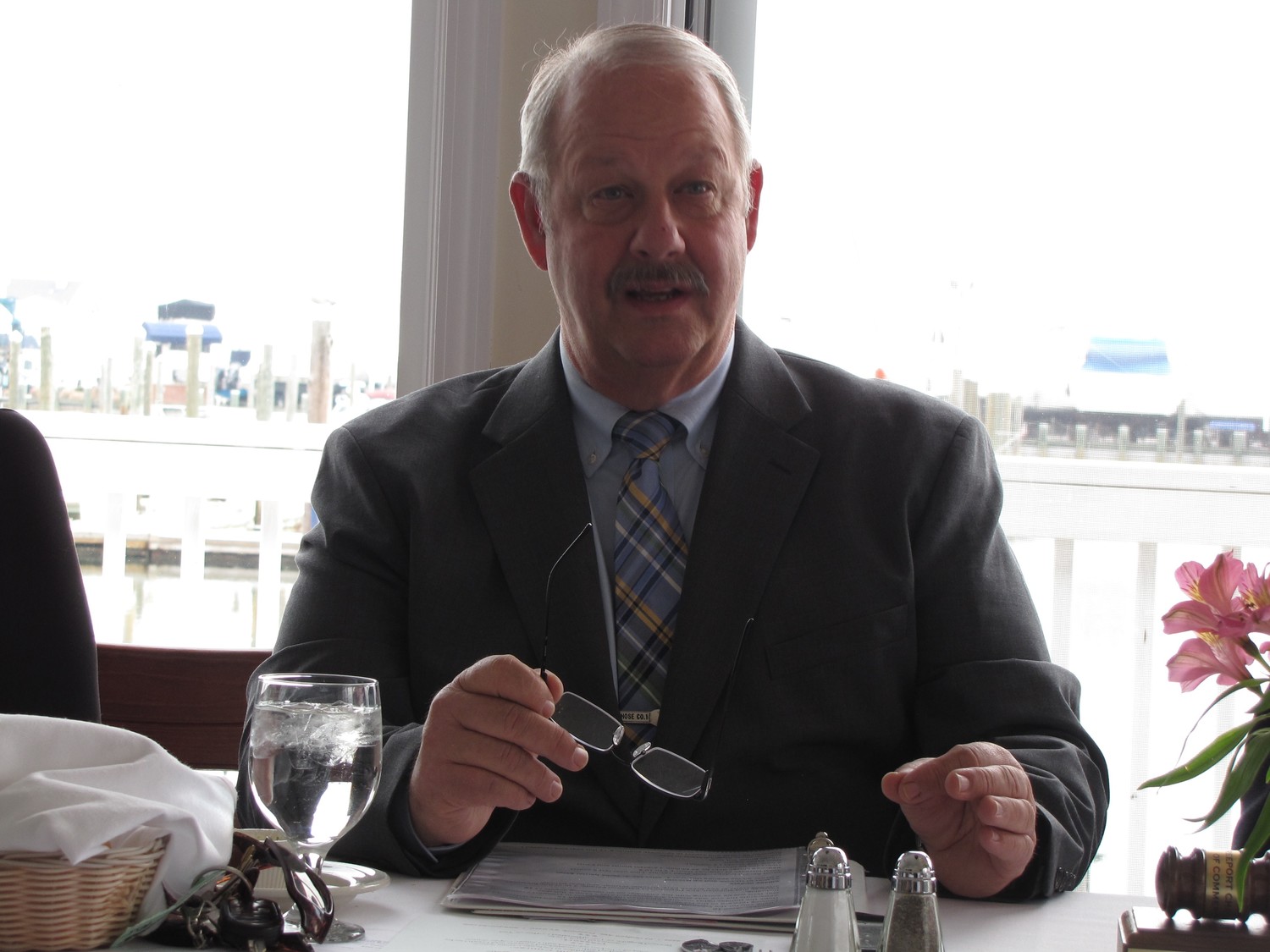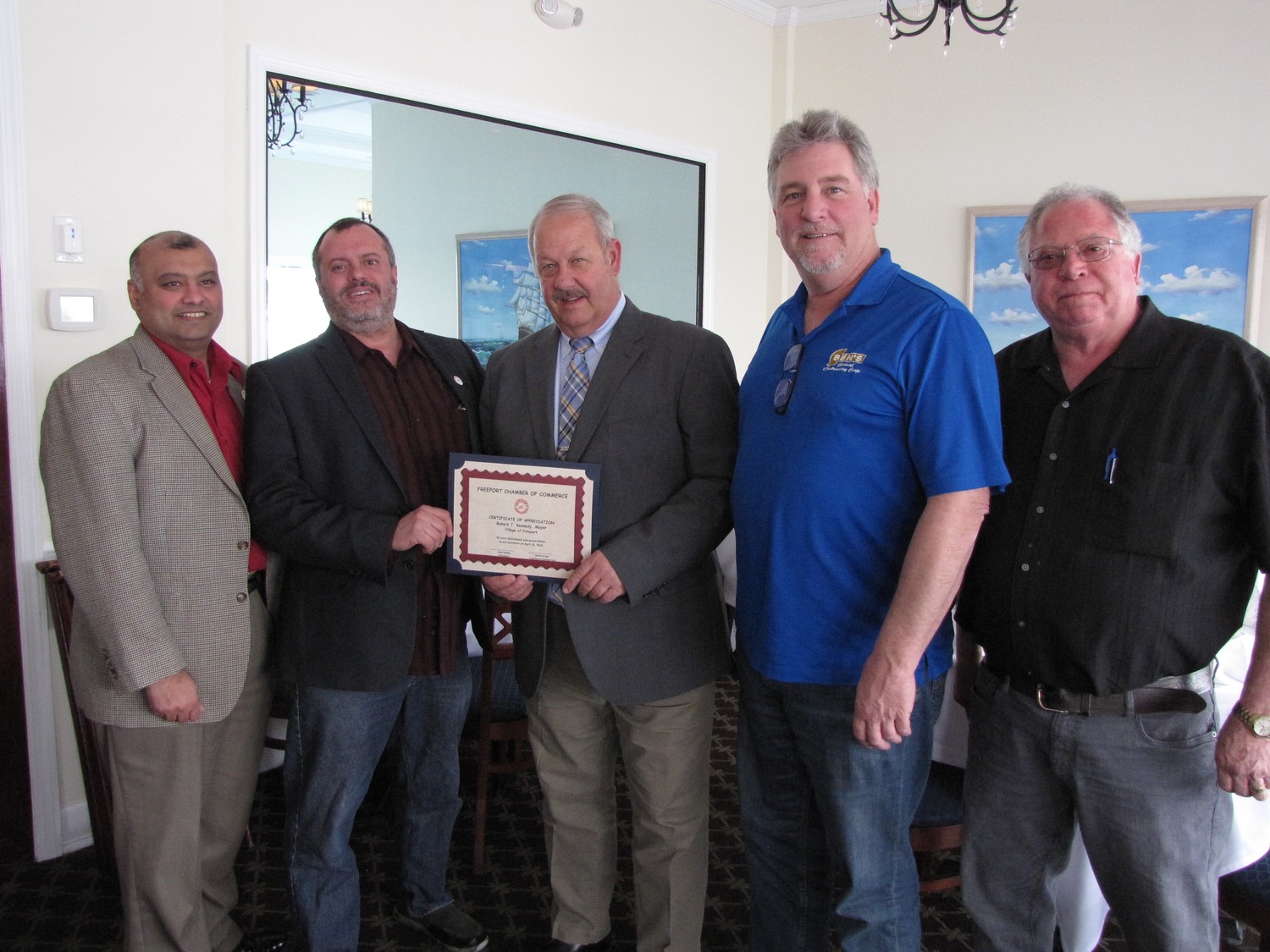Mayor: Freeport wants its share of sales taxes

Editor's note: This story has been further reported and updated since it first appeared in the newspaper on April 12.
Village of Freeport Mayor Robert Kennedy is on a mission to get the village its share of state sales taxes, he says.
Freeport generates roughly $15.8 million a year in sales taxes. The state sends a portion of that money back to Nassau County and the Town of Hempstead, which should share part of it with the village, according to Kennedy, who is president of the Nassau County Village Officials Association. They don’t, however, and they’re not required to, he said.
Freeport, the mayor noted, is not alone. Villages aren't getting back their share of sales tax revenue, he said at the Freeport Chamber of Commerce luncheon on Tuesday and in a phone interview on Wednesday. Now the mayor is campaigning to ensure that Freeport and other villages throughout the county receive at least a portion of state sales taxes.
Kennedy said that Freeport, with a population of 43,000, is the second-largest village in New York state — larger than many cities. With numerous car dealerships and box stores, in addition to mom-and-pop shops, it generates tens of millions of dollars in sales a year.
The village will spend $3.8 million on sanitation in 2018, its current budget states. According to Kennedy, part of the sales taxes that are returned to counties and towns should be used for sanitation. The state, he said, allocates $49 per person for this purpose.
When Hempstead calculates its figures, the mayor said, it includes census data for the villages, meaning that, in the case of Freeport, the town adds 43,000 people to its rolls, which brings in an additional $2.1 million in sales tax revenue for the town. Kennedy argues that Freeport is entitled to that money, which would fund a large portion of its trash collection and disposal.
He noted that the City of Long Beach, with a population of 33,700, receives $1.6 million in state sales tax revenue.
The Town of Hempstead once provided trash disposal for Freeport, Kennedy said. The village and the town, however, were embroiled in a dispute six years ago, he said, with the town contending that the village was not sending enough tons of garbage to the Covanta plant in Westbury for incineration. So the village established its own santitation program, he said, but the town did not provide state sales taxes to Freeport that he believes should have been earmarked for the village.
Freeport does not provide sanitation entirely on its own, though. In 2015, Kennedy and then Hempstead Supervisor Kate Murray signed an agreement allowing Freeport residents to drop off large refuse at the town's transfer station in Merrick and hazardous materials through the town's STOP Program, with no tax increase for Hempstead or Freeport residents, according to a published report.
In a recent village brochure, the mayor states, "The Freeport Sanitation Department collects refuse and debris from homeowners and roadways throughout the village." In that same brochure, he also tells Freeport residents, "In the event that your garbage exceeds the limit for your household, you can dispose of those items at the Town of Hempstead Sanitation Department's Homeowoner Disposal Area" in Merrick.
Kennedy said he has reached out to the new Town of Hempstead supervisor, Laura Gillen, a Democrat from Rockville Centre who grew up in Baldwin. Gillen took office in January, and thus far Kennedy has not received a response, he said.
A town representative could not reached for comment at press time.
Kennedy said he hoped to negotiate a settlement with the town to ensure that Freeport and other villages receive a share of state sales taxes. If not, he said, he is considering suing the town and Nassau County.
“The town doesn’t want to give up any money,” Kennedy said. “I may have to litigate . . . I’m at the mercy of the town, who’s not giving us anything, and the mercy of the county, who’s not giving us anything.
“We have our own sanitation department that does pickup, transportation and disposal,” he said, “so why would the town then be allocated the money for sanitation?”
A petition was circulated among villages across the county, asking for a portion of state sales taxes to be returned to them. Sixty-three of the 64 villages signed it, Kennedy said. And the mayor said he has reached out to the new county executive, Laura Curran, a Democrat from Baldwin, and State Assemblyman Brian Curran, a Republican from Lynbrook.
Finally, the mayor noted that a number of villages do use the towns for garbage disposal, in which case they should not receive state sales tax revenues.
Other news
At the Chamber of Commerce luncheon, Kennedy continued to tout a $300 million project that he believes could save communities like Freeport during a major hurricane the likes of Sandy: floodgates at Jones and East Rockaway inlets.
Kennedy is seeking to drum up support for the proposal. “I’m really pushing for these surge barrier gates,” the mayor told the audience of local business leaders at Pier 95, on Hudson Street, near the Nautical Mile, which was devastated in Sandy.
Floodgates, the mayor has contended for months, would stop the Atlantic Ocean’s onslaught during a hurricane, noting that much of the damage that Long Island suffered during Sandy was caused by the storm’s 10-foot surge.
U.S. Sen. Chuck Schumer secured a $3 million federal grant to support a three-year study by the Army Corps of Engineers to assess the feasibility of installing the floodgates.
On April 22, Kennedy will travel to Bedford, Mass., to meet with the U.S. Army Corps of Engineers and tour the New Bedford Hurricane Protection Barrier. Construction began on the project in October 1962 and was completed in January 1966. As of September 2001, the New Bedford barrier had prevented $24.1 million in flood damage, according to the Army Corps.
Kennedy has invited anyone from the community who is interested in attending the tour to join him.
Climatologists say it is critical that coastal communities begin to prepare now for rising sea levels caused by global warming. Predictions are that sea level could rise 5 percent by the end of the century, which would cause greater inland flooding than Long Island experienced during Sandy.
“The surge barrier gates [in Bedford] were built 48 years ago, and they’ve never failed,” Kennedy said. “I think everyone will be surprised.”

 39.0°,
Fair
39.0°,
Fair 





